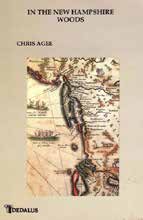
In the New Hampshire Woods
The Dedalus Press, 1992
ISBN: 1-873790-20-1
Purchase
“In Chris Agee’s poetry, the richness of sound is the manifestation of a richness of thought. Line after line, there are quiet surprises of diction, cadence, accuracy. His awe of and his reverence for the visible world, the ‘bounty of Creation,’ remind me sometimes of Jeffers, but he is utterly without Jeffers’ sour misanthropy: only a profound sorrow for human failure in the face of so much radiance. He is a religious poet in an irreligious age. And at a time when so many poets huddle in a cramped vernacular, abandoning some of our strongest and sweetest words to the oblivion of dictionaries and crossword puzzles, I particularly prize his poems for their calmly sumptuous language, their overflowings, their adorations. They glitter with light, like the deep.”
— Robert Mezey (commenting on the shortlist for the 1994 Kingsley Tufts Prize)
“Agee’s poems evoke the original world of the creation, not nature, seen in the light of that first day, which still reaches us.”
— Samuel Menashe
“Chris Agee’s imagination is fine-tuned to the frequencies of matter itself and all its animate manifestations. Under his rapt, celebratory gaze his chosen American and Irish landscapes throb and shine. What I admire most about his work is the way he finds for all this multitudinous, kinetic, dazzling life an answerable style – a language not only lyrical, particular, richly descriptive, but always (and increasingly in the more recent work) informed with philosophical purpose, a purpose that edges effortlessly and unsentimentally into the realm of the spirit, of ‘that which is neither sacred nor profane.’ His poems keep reminding us that ‘the world is a gift.’ It is a gift, however, never to be taken lightly, for it is also, he knows a passing mystery, ‘our soul’s milk and honey.’ In their mixture of observation, contemplation, and invention, as well as in the style Agee fashions for himself by blending American and Irish poetic registers, these poems create their own distinctive space and sound.”
— Eamon Grennan
“Chris Agee’s careful documentation of nature, his eschewal of cleverness, his poetry’s modest refusal to be ‘about’ anything, will not be unfamiliar to reader of American poets such as Charles Wright, Gary Snyder or, most importantly, William Carlos Williams.”
— Devin Johnston, The Honest Ulsterman
“In The New Hampshire Woods is a memorable collection. In its total-absolute drive for empathy with the ‘natural’ world, I have not seen much to challenge it. Agee’s work draws on the Imagists, the Japanese, on Celtic affinities, Hopkins – but goes beyond to form its own coherent and classical vision …’
— John Ennis, Poetry Ireland Review
“The book as a whole leaves one in no doubt that here is a considerable talent … Agee’s language is charged, energetic, and various. Despite the poet’s immediate response to the world of the senses, this is a highly intertextual book, peppered with allusions to Auden, Lowell, Frost and Eliot, to name a few. Agee’s energetic evocation of the whaling history of New England has the passionate intensity of Lowell’s ‘A Quaker Graveyard in Nantucket.’”
— Jonathan Allison, The Irish Literary Supplement
“The genius loci of In the New Hampshire Woods might seem far from Irish, but even in the book’s North American section there are pleasure of recognition for anyone attuned to our natural world … whether his poems speak of Rathlin or Rhode Island, gannets or loons, they mirror one driftwood shore of the Atlantic in the other: a continuum explored with accomplishment and understanding.”
— Michael Viney, The Irish Times
“But those literary comparisons are helpful only up to a point. Agee is not captive to earlier styles, and although his poems are intended more to delight than instruct, they frequently show his ability to think – as well as to perceive and feel – in an individual way. Many of his sensory and contemplative apprehensions act magnetically on reserves not only of personal memory but also of scholarship, attracting tiny fragments of history, mythology, philosophy (eastern and western) literature, painting and various sciences. Hence spectral vistas are often added to concrete particulars, so that the poems are linked with a humanity far beyond the observer’s.”
— Richard Kell, Iron